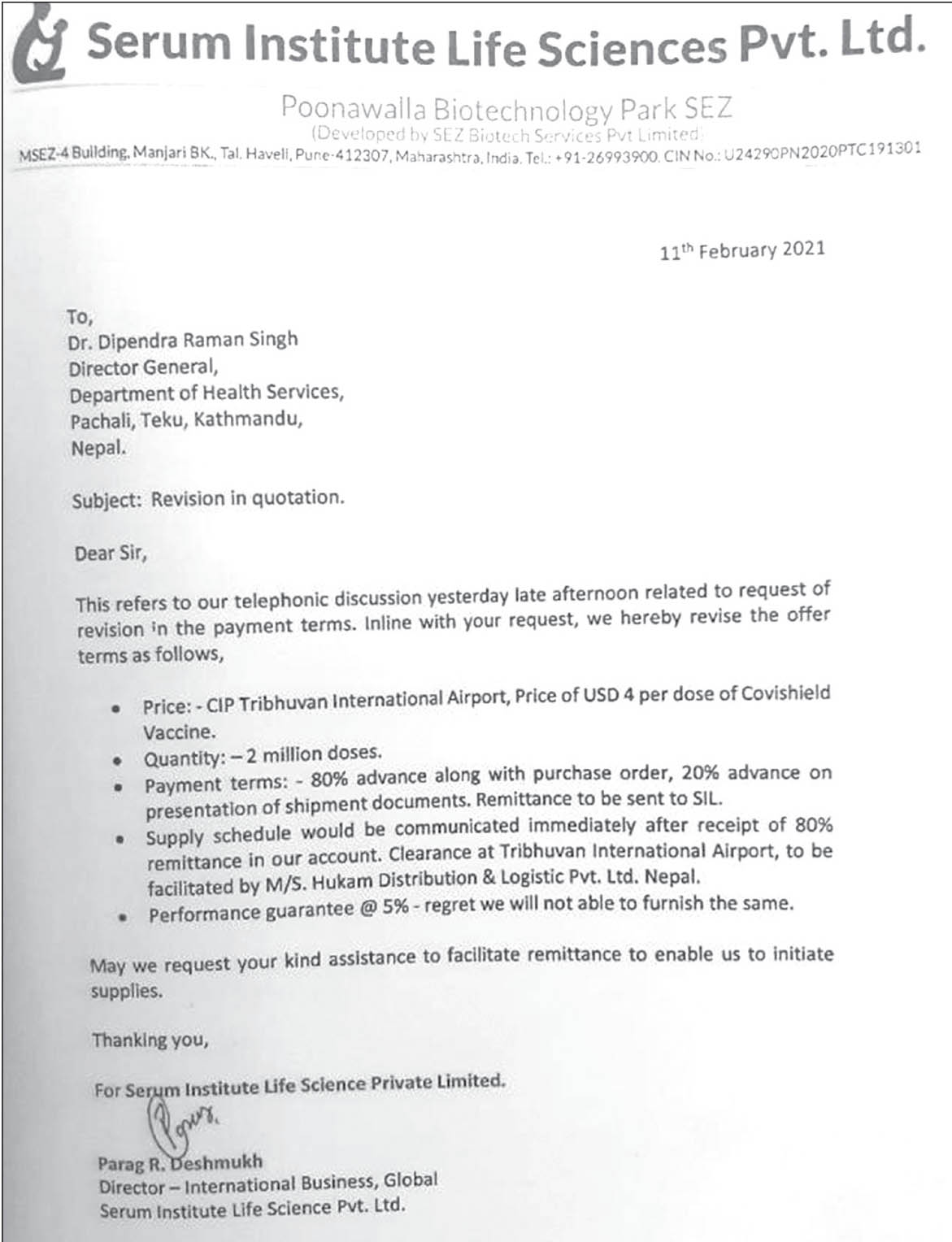Nepal wanted to buy millions of jabs. Here’s how it failed
In early March, Health Ministry officials said that the government’s plan to procure additional doses of Covishield from the Serum Institute of India was facing a glitch.
After signing a deal with the Pune-based biotechnology company for 2 million doses of vaccine at $4 per dose, the government was looking forward to bringing in an additional 5 million doses. The government, according to officials, was ready to pay $5.5 per dose for those additional vaccines.
“But we were asked to pay 10 percent extra on every dose as ‘commission’ to the manufacturer’s local agent,” an official at the Health Ministry told the Post on March 8. The official did not divulge the name of the company’s local agent.
According to the official, the ministry requested the company to sell the vaccine directly to the government and remove the commission for the agent.
“The company refused,” the official said.
The Post’s attempts to talk to officials of the Serum Institute did not succeed.
Until early March, the second wave of the virus had not hit Nepal. On March 8, the number of new cases was 89, with one death. The death toll was 3,011. The number of active cases stood at 872.
Things were not looking bleak at the time. A little less than two months earlier, Nepal, on January 27, had launched its inoculation drive with the 1 million doses of Covishield vaccine provided by India under grant assistance. On February 21, shipment of 1 million of the 2 million doses, for which the government had paid the Serum Institute, arrived. On March 7, 348,000 doses of Covishield under the World Health Organisation-backed COVAX facility landed at Tribhuvan International Airport.
Government officials said the remaining 1 million doses from India would arrive soon. It appeared as if Nepal was well ahead of many countries in the world when it came to vaccinating its citizens.
But it was not to be.
In a series of interviews with various media outlets, Health Minister Hridayesh Tripathi said the government was facing challenges in bringing in additional doses of vaccines. He attributed the delay to some local agents who wanted a commission.
***

In the second week of April, Tripathi told the Post that some local agents [of the manufacturer] were seeking commissions, insinuating new vaccine consignments were not going to arrive anytime soon.
Tripathi did not reveal who the agents were.
The same evening, in an interview with Kantipur Television, Tripathi said three weeks were lost in attempts to get rid of the agents, as they started demanding commissions for the 5 million doses of vaccine the government was planning to procure.
“They are well-known people, known to everyone. They call themselves reputed commercial houses,” Tripathi told the show’s host. “We lost about three weeks to 25 days just trying to get rid of them. And just then cases started to rise in India. Those three weeks to 25 days were very crucial for us.”
According to Tripathi, in his private conversation with the manufacturer, he was informed that it was not in a position to make any new commitments.
“My understanding is these commission agents got activated and influenced everyone here and there [India],” said Tripathi. In response to the host’s question if the minister meant the “middlemen” were such powerful people, Tripathi said, “They indeed are. Middlemen are very influential… in every project.”
On April 29, Tripathi gave yet another interview to the Nepali Times.
“After the initial donation from India, we even bought 2 million doses of Covishield from the Serum Institute,” Tripathi told the Times. “We then offered to buy 5 million more. But the local agent here in Nepal of the manufacturing company asked for 10 percent in commission, forcing us to step back.”
According to Tripathi, the involvement of middlemen, who were also present when the government bought the vaccine at $4 per dose complicated the procurement for 27 days. “By then,…
Read More: Nepal wanted to buy millions of jabs. Here’s how it failed














